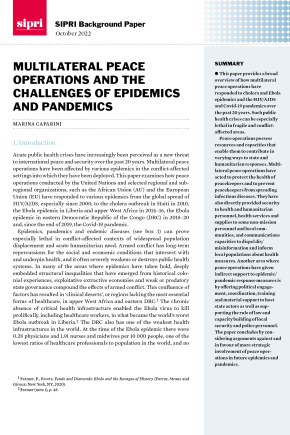Multilateral Peace Operations and the Challenges of Epidemics and Pandemics
This paper provides a broad overview of how multilateral peace operations have responded to cholera and Ebola epidemics and the HIV/AIDS and Covid-19 pandemics over the past 20 years. Such public health crises can be especially lethal in fragile and conflict-affected areas.
Peace operations possess resources and capacities that enable them to contribute in varying ways to state and humanitarian responses. Multilateral peace operations have acted to protect the health of peacekeepers and to prevent peacekeepers from spreading infectious diseases. They have also directly provided security to health and humanitarian personnel, health services and supplies to some non-mission personnel and local communities, and communications capacities to dispel dis/misinformation and inform local populations about health measures. Another area where peace operations have given indirect support to epidemic/pandemic response measures is by offering political engagement, coordination, training and material support to host state actors as well as supporting the rule of law and capacity building of local security and police personnel. The paper concludes by considering arguments against and in favour of more strategic involvement of peace operations in future epidemics and pandemics.
I. Introduction
II. Peace operations, epidemics and pandemics
III. Peace operations that address epidemics and pandemics
IV. Peace operations and dealing with epidemics and pandemics: Opportunities and challenges
V. Cooperation and coordination
VI. Conclusions

